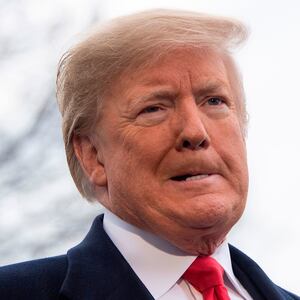The battle between Congress and the president will be historic. It’s too early to say which side will win, but I have a hunch who might lose: the courts.
Here’s what I mean. We all know that President Trump’s strategy to stonewall congressional investigations, to defy congressional subpoenas—all congressional subpoenas—will diminish Congress if it succeeds.
But Trump’s strategy would also diminish the judiciary, perhaps even more than Congress. Why? Because Trump’s strategy can only succeed if courts are impotent, unable to perform the duty to police the separation of powers that the Constitution assigns them.
ADVERTISEMENT
Trump’s criticisms of congressional investigations are the same that he made of the Mueller investigation.
The first is that the investigations are partisan. “We’re fighting all of the subpoenas,” he told reporters. “Look, these are not like impartial people. The Democrats are trying to win 2020.”
Second, he says it’s a witch hunt. “I DID NOTHING WRONG,” he shouted in a tweet.
There is little pretense that Trump has meritorious legal arguments that the subpoenas are not within the House’s oversight power. His strategy is to delay—to “drag everything out,” to require “protracted” litigation even if the facts and the law are squarely against him. “Trump can run out the clock by taking a hardline position,” an unnamed source “familiar with the president’s litigation strategy” told Axios.
The people in Trump’s orbit hardly cooperated cheerfully with the Mueller investigation, and some may have committed perjury, but few defied subpoenas. Enforcement of subpoenas in court proceedings is immediate and effective. A judge has civil contempt powers and can order from the bench that someone who defies a subpoena be incarcerated immediately and held until the person obeys. And in criminal cases, a judge can refer contempt charges to the Department of Justice for prosecution. If the DOJ fails to prosecute, the judge can appoint a special prosecutor.
In theory, Congress has the same subpoena power and much the same enforcement power. In practice, however, Congress’s enforcement powers are much less effective, and it has little power to deter defiance.
The House and the Senate each have inherent contempt powers that are equivalent to the civil contempt powers that judges have. The House can vote to incarcerate anyone who defies a congressional subpoena until he or she complies. There are reasons that neither chamber has used that power since 1935. Americans do not expect fellow citizens to be incarcerated by a partisan vote of the House or the Senate, and in this case House Republicans would do everything they could to make the proceedings a spectacle. A Trump ally jailed by the House might well ride the martyrdom to a governorship or Senate seat in a bright red state.
There is a criminal contempt of Congress statute that is effectively identical to the criminal contempt of court statute. But the House has to refer these charges to the Department of Justice to prosecute. Attorney General William Barr made clear in his confirmation hearings that he regarded himself as an Olympian figure in American law and government of unquestioned probity. It is an opinion not universally shared. Barr has consistently acted out of loyalty to Trump and the Republican Party rather than to the Constitution and the rule of law.
The statute requires that Barr prosecute criminal contempt of Congress charges that the House or the Senate refer. Of course, he almost certainly would not.
There is no existing statute or court precedent that empowers the House to demand a special prosecutor for criminal contempt of Congress, although the House probably should anyway. What the House will likely resort to is the procedure established by House Democrats a decade ago: The House will file a civil lawsuit that asks the courts to decide whether the House is entitled to the subpoenaed information, and if so, to order the person subpoenaed to comply.
In other words, Trump administration officials and business associates can ignore congressional subpoenas without consequence until a court issues an order to comply, which may take months if the parties act in good faith and much longer if one of the parties acts in bad faith, Trump’s announced plan.
Trump’s strategy is an insult to Congress. It is also an insult to the courts. The strategy can only work if the courts are feckless, or perhaps complicit.
Court rules forbid any lawyer from filing anything with the court for “any improper purpose, such as to harass, cause unnecessary delay, or needlessly increase the cost of litigation.” And any legal argument in a court filing must be “warranted by existing law or by a nonfrivolous argument” to change the law.
Trump and his allies brag that they will use one dilatory litigation tactic after another to stymie congressional investigations, an improper purpose. And the bar for “nonfrivolous” argument is low, but Trump’s arguments do not clear that bar.
Trump argues that House investigations lack proper “legislative purpose.” “There is no possible legislation at the end of this tunnel,” Trump’s lawyers said in the first of what will undoubtedly be many lawsuits to block House subpoenas.
The factual allegations of the complaint read like a series of Trump tweets. As to the discussion of the law, Trump’s lawyers rely on language from an 1880 Supreme Court decision. Trump’s lawyers either did not know that the language they quoted as binding precedent, or at least good law, was expressly repudiated by the Supreme Court 90 years ago, which would be inexcusably sloppy legal research, or they knew and did not tell the court, which is worse.
Congress’ oversight powers are very, very broad, and should be. They are greatest when Congress investigates evidence of corruption or abuse of power in government. A great American political scientist, Woodrow Wilson, said that Congress’s “informing function” was more important to the nation than Congress’s “legislative function.”
Trump argues that any claim of proper legislative purpose is a pretext for House Democrats’ political motives, a charge that is undoubtedly at least partly true of everything the House or Senate does. So will attempts to enforce subpoenas be tied up in litigation over the House Democrats’ real motives? No. Courts recognize a “presumption of the validity of government proceedings,” the federal trial court said in United States v. Icardi, and will not examine the motives for questions that “are relevant and material to” a “legitimate legislative inquiry.” The courts “have no authority to scrutinize the motives of Congress or one of its committees,” the federal appellate court said in Eisler v. United States.
Trump’s lawyers will make the same frivolous arguments in dozens of lawsuits without regard to what any particular subpoena demands, all after Trump’s allies have publicly said, sometimes anonymously and sometimes on the record, that the arguments are to delay court action.
Judges have ample power to prevent such abuse of court procedures. Judges can strike frivolous legal pleading, which can be fatal to a party’s claims or defenses. Judges can admonish, reprimand, or censure lawyers who file frivolous or dilatory pleadings. Judges can refer lawyers’ conduct to “disciplinary authorities”—in other words, lawyers can lose their licenses for frivolous and dilatory conduct. Judge can impose fines on lawyers “payable to the court,” or require lawyers to pay the opposing party’s legal expenses.
Judges can select a sanction sufficiently harsh “to deter repetition of the conduct or comparable conduct by others similarly situated.” In evaluating possible sanctions, judges can consider whether the conduct “was willful, or negligent”; whether the conduct “was part of a pattern of activity, or an isolated event”; and whether the conduct delayed or drove up the costs of the lawsuit.
All of the considerations support harsh sanctions early and an escalation of sanctions as Trump’s campaign of frivolous delay continues.
In short, judges have the power to stop Trump’s stonewall strategy stone cold. The judiciary has much to lose if they do not. The American people’s trust in the judiciary is already greatly eroded. Few Americans believe that judges just call balls and strikes. Americans fully expect Republican judges to side with a Republican president over Democrats in Congress regardless of the facts or the law. If that expectation proves correct, then “the identity of the loser is perfectly clear,” as Justice Stevens wrote in dissent in Bush v. Gore. “It is the Nation's confidence in the judge as an impartial guardian of the rule of law.”
And if the judiciary allows the president to usurp the constitutional powers of Congress, the judiciary will lose as well. Congress effectively depends upon the judiciary to vindicate Congress’s constitutional power of oversight. The failure by the judiciary to protect the powers of the legislative branch from encroachment by the executive, to protect the constitutional separation of powers from concentration in the executive, would be an abdication of the judiciary’s constitutional duties, and would greatly diminish the judiciary’s own power if it is unable or unwilling to act.
As to Trump’s lawyers, they should consider carefully whether they really want to be the lawyers that Trump demands that they be. Trump’s ideal lawyer was Roy Cohn. Many, probably most of Cohn’s clients were connected to organized crime. Cohn was repeatedly indicted by state and federal prosecutors for alleged conduct that included perjury and witness tampering, only to escape conviction. He was disbarred for unethical conduct shortly before his death.
Cohn would not have flinched at Trump’s stonewall strategy.
Trump may want Roy Cohn for a lawyer. His lawyers should not want to be Roy Cohn.






